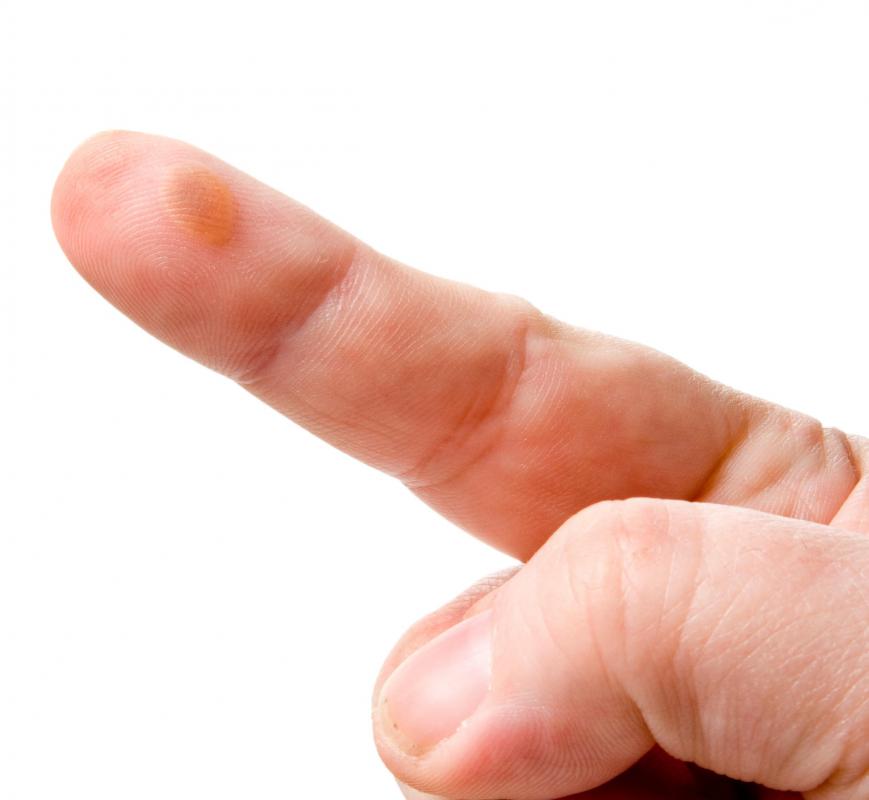At WiseGEEK, we're committed to delivering accurate, trustworthy information. Our expert-authored content is rigorously fact-checked and sourced from credible authorities. Discover how we uphold the highest standards in providing you with reliable knowledge.
What is Herpes Simplex?
The herpes simplex is a disease that is caused by two viruses, herpes 1 and herpes 2, generally referred to simply as HSV-1 and HSV-2. This condition is identified based on where it occurs in the body, with the two major manifestations being genital herpes and oral herpes. Genital herpes, often referred to simply as herpes, occurs on both the male and female genitals, while oral herpes may appear in or around the mouth. In addition to these commonly-known forms, a number of other diseases are also caused by herpes simplex, including neonatal herpes, Mollaret’s meningitis, keratitis, herpetic whitlow, and cerebral herpes infection encephalitis. It is also possible that Bell’s palsy is caused by this virus.
The most noticeable symptom of herpes simplex is the appearance of small, painful blisters. These blisters may itch somewhat, and may sting or ache. They are fluid filled, and may be accompanied by flu-like symptoms, including headaches, aching muscles, exhaustion, and fever. Blisters tend to form close to the lip in the case of oral herpes, and near or on the external sexual organs in the case of genital herpes. In the case of genital herpes, an outbreak may also be accompanied by swollen lymph glands in the genital region, as well as pain while urinating.

Generally, the symptoms of a herpes simplex infection appear for a period of time and then disappear again. At any time the symptoms may reappear, but there are a number of things linked to outbreaks. Most notably, a diminished immune system as a result of other illness can cause the herpes simplex viruses to generate symptoms. Stress has also been associated with herpes, especially the oral and genital varieties. During periods of outbreak the chance of transmission is increased, but it should be stressed that even when no symptoms are visible, and even when the virus has remained dormant for extended periods of time, it can still be transmitted through contact.

The severity of herpes symptoms varies widely from person to person, and may vary from outbreak to outbreak. Many people have few noticeable symptoms, acting simply as passive carriers. For those who do experience symptoms, they generally begin within two days to three weeks of infection, and may then recur at any interval, or when environmental factors cause an outbreak. Recurrences, however, are rarely as intense as the initial outbreak, and many people will experience one outbreak and then see no more symptoms for months, years, or in some rare cases even for the rest of their lives.

There is no known cure for herpes simplex, and there is no known vaccine. There are a number of promising vaccines being studied, but any vaccine is likely to be years away from being perfected. Although herpes simplex cannot be truly cured, there are a number of drugs which can be taken to help diminish shedding of the viral cells, to protect against being infected, and to reduce or eliminate the worst of the symptoms of a herpes outbreak.
AS FEATURED ON:
AS FEATURED ON:














Discussion Comments
I didn't know it was possible, but a person can get herpes simplex ii where they'd usually get herpes simplex 1. A girl I knew in college came back to the dorm after a long weekend and had a large sore in the corner of her mouth. She figured it was a typical cold sore and went to the doctor for a prescription. She came back really upset and embarrassed.
Someone else told me the whole story later. The girl had gone to a club and met a man she didn't really know. They essentially had a one night stand. He happened to be infected with genital herpes, and she had oral herpes. The sore on her mouth was not herpes simplex type 1, but herpes simplex type 2. She had contracted an STD, which is why she was so upset when she came back from what she thought would be a routine exam of a cold sore.
Post your comments